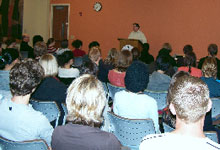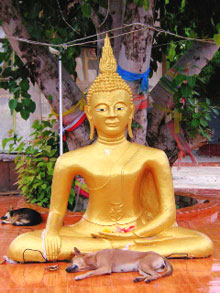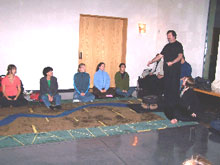
Reverend Don Castro of Seattle Betsuin Buddhist Temple addresses Seattle University students and faculty on the topic of Buddhism and "deep ecology."

EcoSangha Lecture Series Sparks Interest at Seattle University
The concept of Buddhism as a form of “deep ecology” drew some 50 Seattle University students and faculty to a talk by the Reverend Don Castro of the Seattle Betsuin Buddhist Temple on October 8.
Sponsored by EcoSangha Seattle and the university’s Office of Campus Ministry, the event was the first lecture of a three-part series on EcoBuddhism. EcoSangha Seattle consists of two practice groups: one on the Eastside, and one at Seattle University that grew in part from a Zen group under the direction of philosophy professor Jason Wirth, PhD.

Buddha "touching the earth," Thailand. ©Clay Irving.
“To be a Buddhist is to be both an ecologist and a conservationist,” Rev. Castro explained to the audience. “This is a vision modeled on the Buddha as the Great Physician who is called to the service of those in pain and suffering, who scientifically investigates the nature of and prognosis for an ailment and then compassionately effects a cure. The progression from symptom to cure is presented by the Buddha in his fundamental teaching of the Four Noble Truths: symptom, diagnosis, prognosis and cure.”
The Four Noble Truths bring all sects of Buddhism together, Castro said. The cure is compassion: “From our own suffering comes a commitment to help others. The pain of the earth is our pain.” To this end, EcoSangha Seattle aspires to an international grassroots effort that would find answers to urgent environmental challenges; in particular, the destruction of the earth through the three poisons of greed, hatred and ignorance.
EcoSangha Seattle also sets out to inform the conservation community that science and religion are not necessarily at odds. Castro explained that “the Buddha fully understands the profound problem of our earth in crisis. His insights of non-duality and interdependence are applied on a cosmic scale…This is not ecology in the shallow sense, but deep ecology.”

Seattle University's weekly meditation group.
“Not only does Buddhist ecology encompass the study of forest and ocean systems but also human values, family life, and political activities…Nothing is left out because everything is mutually interpenetrating and interdependent. Buddhist ecology, then, is the overarching science bringing all sciences together, both human and natural. For instance, a psychological analysis of human greed is related to consumption of oil, is related to global warming, and so on. Buddhism always teaches of profound causes and conditions.”
In the PBS television series, The Power of Myth, Joseph Campbell called for a global mythology. In offering Buddhism as that mythology, Castro evoked the image of the Buddha in the 'Earth-Touching' mudra (gesture).
“The “Earth-Touching mudra of the Buddha depicts the very moment when Shakyamuni Buddha called upon our Mother Earth to bear witness to his enlightenment. Today, Mother Earth is bearing witness to our wanton mistreatment of her. To cure our mother, we must truly change our mind (and lifestyle) so that conservation becomes an integral part of our Buddhist practice.”
EcoSangha Seattle hopes that this image will unify Buddhists, helping to promote dialogue and cooperation among them that, in turn, brings them together with environmental groups from different religious traditions.
Said Castro, “We may disagree for personal or sectarian reasons on the method of conservation to cure our sick planet. But, we should all be able to agree on the inherent, ecological nature of Buddhism.”
For his own part, Castro wants to see more rapid change in how Buddhists approach everything from commuting to vacationing, recycling to voting. When teaching children at the Seattle Betsuin Buddhist Temple, he challenges them to pause before they throw something away and ask, “Where did it come from? Where is it going?” This, he says, is “a lifetime homework assignment.”
For more information, contact Erin Beary, Ecumenical and Multifaith Minister, at (206) 296-6053 or bearye@seattleu.edu.
Contributor: Amy Groncznack
Photos #1 & #3: Bill Hirsch
Photo #2: Clay Irving